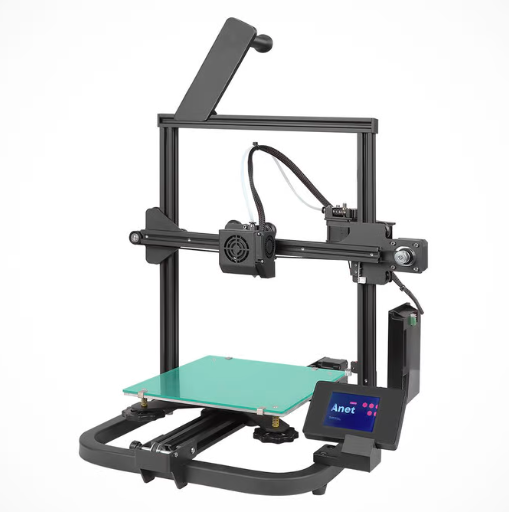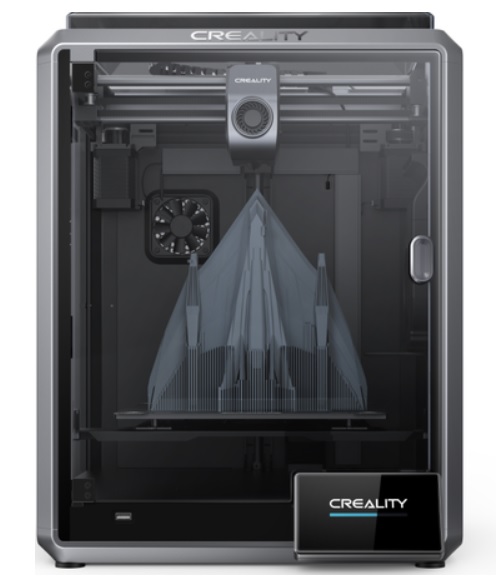Compare A8 V2 vs K1
Comparison between the best 3D printers
Choose the best 3D printer at the best price. The cheapest 3D printers are here.
Buy a 3D printer here with 3D Fila.
 |
 |
|
| Model | A8 V2 |
K1[BUY K1] |
| Printing Material | Filament | Filament |
| Buy Filament for Anet A8 V2 | Buy Filament forCreality 3D K1 | |
| Estimated price | $129,00 | $399,00 |
| Manufacturer | Anet | Creality 3D |
| Release Year | 2021 | 2023 |
| Print Volume [mm] | 220x220x250 | 220x220x250 |
| Printer Size [mm] | 428x441x486 | 355x355x480 |
| Weight [kg] | 6,2 | 12,5 |
| Power Loss Recovery | NO | YES |
| Enclosed printer | NO | YES |
| Bed Leveling | Manual | Automatic |
| Filament End Sensor | NO | YES |
| Bed type | Heated | |
| Power supply system | Bowden | Direct Drive |
| Standard nozzle | 0,4 | 0,4 |
| Maximum Nozzle Temperature [°C] | 230 | 300 |
| Maximum Bed Temperature [°C] | 120 | |
| Maximum printing speed [mm/s] | 150 | 600 |
| Filament holder | YES | YES |
| Camera for supervision | NO | NO |
| Recommended filaments | PLA | ABS, PLA, PETG, PET, TPU, PA, ABS, ASA, PC, PLA-CF, PA-CF, PET-CF |
| Recommended slicers | Cura, Simplify, Slic3r, IdeaMaker | Creality Print; Cura, Simplify3D e PrusaSlicer |
| Maximum Resolution [mm] | 0,1 | 0,1 |
| Processor | ||
| Display | Display touchscreen 2,8'' | Display touchscreen 4,3'' |
| Power Supply | 110/220V / 250W | 110/220V / 350W |
| Connectivity | SD / USB | Ethernet / USB / Wi-Fi |
| Operating systems | Windows, Mac, Linux | Windows, Mac, Linux |
| Date of registration in the system | 2022-11-10 | 2023-04-17 |
| Release date | 2021 | 2023 |
| Extra features | The Anet A8 V2 is a Cartesian-XZ type 3D printer with a build volume of 220 x 220 x 250 mm, Ender 3 design and V-slot assembly. It has a 32-bit motherboard and touchscreen interface, promising ease of use. It uses open source firmware and has thermal failure protection. It stands out for its cable organization and the absence of a heated bed, focusing on energy savings and PLA printing. It comes with an external power adapter, aiming at greater safety, especially for beginners and educational use. | The K1 is an extremely fast FDM 3D printer, reaching 600mm/s, 12 times faster than standard models. Equipped with a Core XY system and lightweight print head, it offers energy efficiency and high print quality. It stands out for its dual-gear extruder and quickly heated hotend, as well as dual cooling to prevent warping. Its robust structure ensures stability at high speed, with optimized software to speed up the printing process. |
| Support for multiple colors and materials (AMS and CFS) | NO | NO |
Notes * |
||
| Cost-benefit | 6 / 10 | 7 / 10 |
| Hardware | 0.5 / 10 | 4.2 / 10 |
| Tela | . | . |
| Print volume | 3 / 10 | 3 / 10 |
| Performance | 1 / 10 | 5 / 10 |
| [BUY K1] |
Conclusion |
| In comparing the Anet A8 V2 and the Creality 3D K1, several key factors influence their overall value and suitability for different users. The Anet A8 V2 is positioned as a budget-friendly option that offers a decent build volume and is easier on the wallet. However, it lacks advanced features such as automatic bed leveling, power loss recovery, and a fully enclosed build chamber, which could be important for users seeking reliability and ease of use—particularly beginners or those working with more sensitive materials. While it does come with a heated bed and utilizes a straightforward design, its performance on speed and material compatibility may limit more advanced users. On the other hand, the Creality 3D K1, although more expensive, offers a significantly improved printing experience. With a top printing speed of 600 mm/s and features like automatic bed leveling, a dual-gear extruder, and enhanced temperature capabilities, it is better suited for users who require speed and quality in their 3D printing projects. The K1's robust build and additional connectivity options also make it more versatile for various settings, from hobbyists to professional environments. Ultimately, the choice between the two models should depend on individual needs. If budget constraints and simple PLA printing are the primary considerations, the Anet A8 V2 is a reasonable choice. However, for those prioritizing speed, performance, and future-proof features, the Creality 3D K1 justifies its higher price with superior capabilities. Thus, for users looking to balance performance and cost, the K1 offers significant advantages, resulting in a better overall cost-benefit ratio. |

